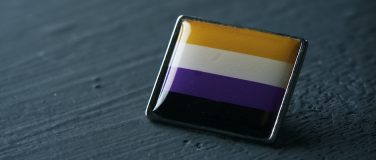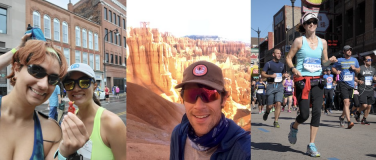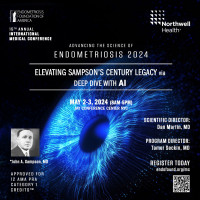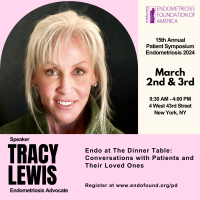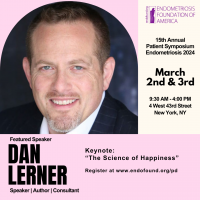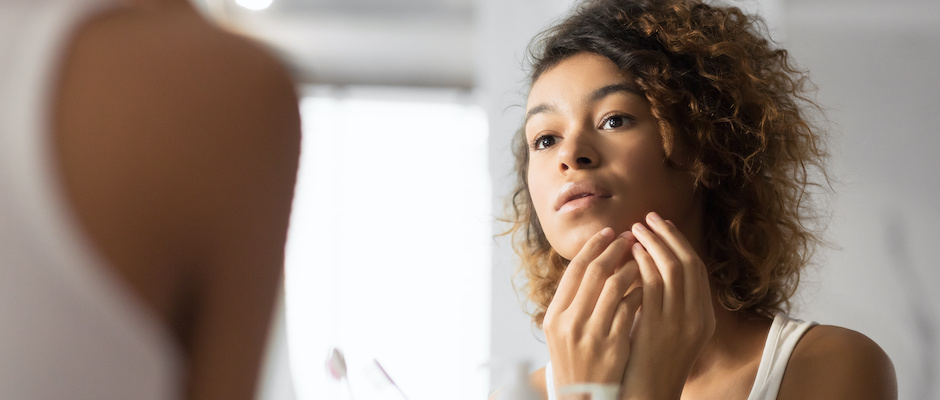
As I write this, I’m trying my hardest not to pick at a cystic pimple that’s lurking beneath the skin on my chin, just waiting to make its debut. If you’re like me and also suffer from cystic acne, you know that your breakouts seem to time themselves perfectly, ensuring they’ll be present for parties, important work functions, and other events where you’d love to have clear skin. Cystic pimples can also take weeks to disappear, which feels like forever when you’ve got a huge, painful bump taking up residence on your face.
What exactly is cystic acne, what’s its connection to endometriosis, and how do you make these stubborn zits vanish? Here are some answers to the most common questions about the link between the two conditions, direct from board-certified dermatologists.
What exactly is cystic acne?
As the name suggests, cystic acne is when you develop deep, inflamed cysts below the skin. These pimples can lead to scarring if not properly treated, says Dr. Scott Paviol of Paviol Dermatology.
Cystic acne is the most severe form of acne (lucky us) and typically shows up along the chin and jawline. Cystic acne’s size and staying power make it more challenging than, say, small bumps that pop up if you forget to wash your face properly for a night or two.
What causes cystic acne?
“Acne is multifactorial in nature, but typically it’s a combination of excess oil, clogged pores, inflammation, and bacterial accumulation,” says Dr. Paviol.
Additionally, you may notice that your cystic acne flares in the days or weeks leading up to your menstrual cycle.
What role do hormones and endometriosis play in the development of cystic acne?
The short answer? Usually, a pretty significant one for hormones, and about 1% of patients who suffer from endometriosis also battle cystic acne.
To get more scientific, Dr. Paviol explains it this way, “Typically androgens (testosterone, DHEA, and dihydrotestosterone) make acne worse and estrogens make acne better. Women are more prone to develop acne later in life as estrogen levels lower with age and women lose some of the protective effects of estrogen over time. Because women with endometriosis often experience hormonal imbalance, they often experience hormonal acne.”
Dr. Emily McLean of Novant Health Dermatology SouthPark adds to this by saying, “Hormones are known to regulate sebum production, and having an excess of sebum can lead to acne. There are studies that show that patients with severe acne during the teenage years may have a higher risk of endometriosis.”
According to one study published in Human Reproduction, 0.5% of patients suffer from endometriosis and cystic acne, while 0.4% of patients have cystic acne but do not have endometriosis. The study concludes that endometriosis is positively associated with severe teenage acne, but the 0.38 vs. 0.49% is too low to use it as a diagnostic criteria.
How do you treat cystic acne?
Step one is to get established with a dermatologist who has experience in treating this specific, stubborn type of breakout.
“Make a dermatology appointment to get a comprehensive plan that will address things such as diet, like dairy intake and processed carbs, lifestyle, and health conditions such as endometriosis, PCOS, or medications,” says Dr. Paviol.
Your exercise regimen can also play a role, as sports and sweating can prompt flares, so factor that into your treatment plan as well.
Unfortunately, cystic acne tends not to respond to the same treatments that are effective in managing other breakouts, like oral antibiotics. Instead, your doctor might put you on a drug called spironolactone to control cystic acne flares.
Seriously, keep your hands off your skin
If you just can’t resist trying to pop a pimple in hopes that you’ll make it go away, you’re not alone. Even dermatologists get tempted from time to time.
“I can’t say I’ve never picked a pimple,” says Dr. Paviol. “That being said, when you do pick or pop a pimple, though extremely gratifying, you’re increasing the chance of creating a long-term scar on your face. It’s like choosing to explode a bomb and causing collateral damage, versus defusing it peacefully.”
Yikes. So, yes. It really is that important to leave pimples alone.
Act quickly if you feel a large pimple forming
If you struggle with cystic acne, inevitably you’ve had that experience where you can feel a bump forming under the surface of your skin. You’re hoping it goes away and are starting to panic as it continues to grow. What do you do?
“The most important thing is to keep your hands off the pimple and avoid picking. Warm compresses, acne dot hydrocolloid bandages, and benzoyl peroxide products can also be helpful at home to aid healing,” says Dr. McLean.
If the spot is tender or draining, she recommends making an appointment with your dermatologist to see if an injection of a small amount of steroid would help. These injections calm inflammation, allowing the pimple to heal faster. The pain is minimal, so even the needle-phobic among us should consider giving them a try.
If a pimple emerges, take action to shorten its lifespan
Though cystic acne tends to linger for weeks on end, there are steps you can take to shrink the zit. First and foremost, Dr. Paviol recommends focusing on your cleaning regimen.
“Over-the-counter acne-fighting cleansers, gels, and creams with salicylic acid and benzoyl peroxide can help to calm down flares. In addition, Differin is a retinoid medication that is now over-the-counter and works like Draino for your pores,” he says.
If you’ve got time to drop by your dermatologist’s office, he also suggests trying an acne-targeted facial or a laser treatment to quickly zap problematic pimples.
Pay attention to what you’re putting on your face
Additionally, the products you put on your face directly impact how your skin looks, making it important to be mindful of what you’re choosing. Dr. McLean recommends looking for makeup products that are labeled non-comedogenic, meaning they won’t clog your pores or worsen acne.
Unfortunately, cystic acne is stubborn and hard to permanently eliminate. But taking good care of your skin, paying attention to your diet and lifestyle, and choosing your makeup and skincare products carefully can help ensure you don’t have an unwanted plus one in attendance at your next event.



